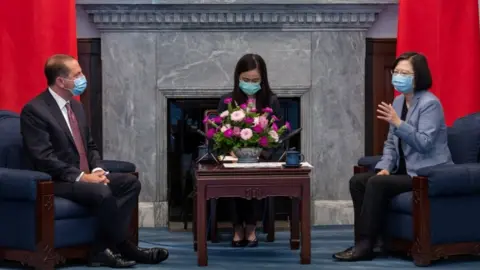US angers China with high-profile Taiwan visit
 EPA
EPAA US cabinet member met Taiwan’s president on Monday - a move that has angered China and increased tensions between Washington and Beijing.
Health and Human Services Secretary Alex Azar is the highest-ranking US politician to hold meetings on the island for decades.
Taiwan is self-ruled and sees itself as distinct from the mainland but China regards it as a breakaway province.
China urged the US to respect what it called its “one China” principle.
“China firmly opposes any official interactions between the US and Taiwan,” a foreign ministry spokesman said when the visit was announced last week.
“We urge the US… not to send any wrong signals to ‘Taiwan independence’ elements to avoid severe damage to China-US relations.”
Mr Azar, who arrived on the island a day before meeting President Tsai Ing-wen, said there were “three overarching themes” for the visit.
“The first is to recognise Taiwan as an open and democratic society, executing a highly successful and transparent Covid-19 response,” he said.
“The second is to reaffirm Taiwan as a long partner and friend of the United States.
“The third is to note that Taiwan deserves to be recognised as a global health leader with an excellent track record of contributing to international health."
 Reuters
ReutersAlthough the US does not have a formal diplomatic relationship with Taiwan, the 1979 Taiwan Relations Act allows the US to sell arms to the island, and commits it to “close relations”.
Taiwan has confirmed fewer than 480 Covid-19 cases and just seven deaths.
It cancelled flights from Wuhan on 23 January – before most other countries – introduced quarantine for other arrivals, and was able to track and trace infections.
Taiwan is not a member of the World Health Organization, because it is not recognised by China or the United Nations.
On 31 December, the Taiwan government asked the WHO for more information about the virus, but said it got no reply.
That was seized upon by President Trump in April, in a tweet criticising the WHO.
The WHO said the Taiwanese email “made no mention of human-to-human transmission”.
